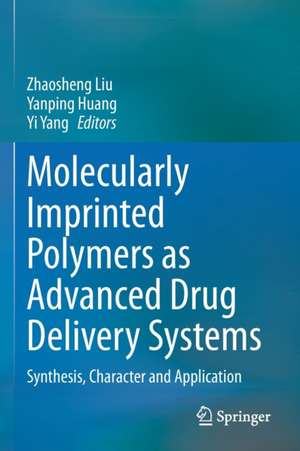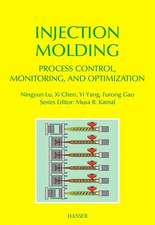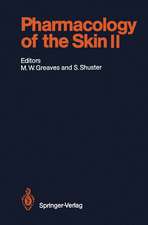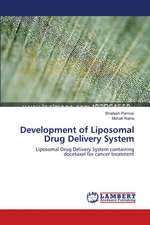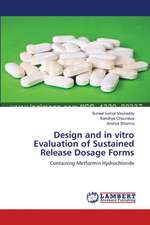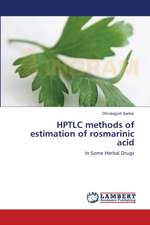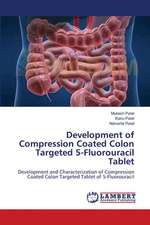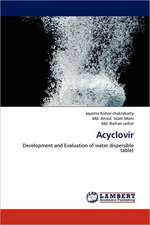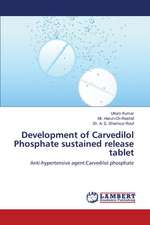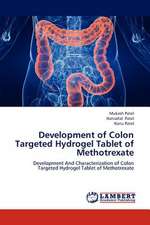Molecularly Imprinted Polymers as Advanced Drug Delivery Systems: Synthesis, Character and Application
Editat de Zhaosheng Liu, Yanping Huang, Yi Yangen Limba Engleză Paperback – 23 apr 2022
To this end, the following unique features will be discussed and concluded:
1) State-of-the-art definition of MIP as drug delivery systems.
2) Advanced techniques and clinical applications of MIP as drug delivery systems in the past decade.
3) Novel frontiers and brand-new technologies, for example, drug delivery devices for zero-order sustained release and stimuli responsive imprinted DDS.
4) Revolutionary impact on dermal delivery, ophthalmic drugs and cancer treatment.
5) Future challenges and perspectives
| Toate formatele și edițiile | Preț | Express |
|---|---|---|
| Paperback (1) | 1090.40 lei 6-8 săpt. | |
| Springer Nature Singapore – 23 apr 2022 | 1090.40 lei 6-8 săpt. | |
| Hardback (1) | 1097.36 lei 6-8 săpt. | |
| Springer Nature Singapore – 23 apr 2021 | 1097.36 lei 6-8 săpt. |
Preț: 1090.40 lei
Preț vechi: 1147.80 lei
-5% Nou
Puncte Express: 1636
Preț estimativ în valută:
208.68€ • 217.05$ • 172.27£
208.68€ • 217.05$ • 172.27£
Carte tipărită la comandă
Livrare economică 15-29 aprilie
Preluare comenzi: 021 569.72.76
Specificații
ISBN-13: 9789811602290
ISBN-10: 9811602298
Ilustrații: VII, 216 p. 108 illus., 68 illus. in color.
Dimensiuni: 155 x 235 mm
Greutate: 0.32 kg
Ediția:1st ed. 2021
Editura: Springer Nature Singapore
Colecția Springer
Locul publicării:Singapore, Singapore
ISBN-10: 9811602298
Ilustrații: VII, 216 p. 108 illus., 68 illus. in color.
Dimensiuni: 155 x 235 mm
Greutate: 0.32 kg
Ediția:1st ed. 2021
Editura: Springer Nature Singapore
Colecția Springer
Locul publicării:Singapore, Singapore
Cuprins
Chapter 1. Introduction.- Chapter 2. Synthetic Strategies for the Generation of Molecularly Imprinted Polymers.- Chapter 3. Special Control by Molecular Imprinting Materials-zero-order Sustained Release, Enantioselective MIPs and Self-regulated Drug Delivery Microdevices.- Chapter 4. Water Compatible Molecularly Imprinted Polymers.- Chapter 5. Stimuli Responsive Imprinted DDS.- Chapter 6. MIP as Drug Delivery Systems for Dermal Delivery.- Chapter 7. MIP as Drug Delivery Systems of Anticancer Agents.- Chapter 8. MIP as Dug Delivery Systems of Ophthalmic Drugs.- Chapter 9. MIP as Drug Delivery Systems for Special Application.- Chapter 10. Outlook.
Notă biografică
Zhaosheng Liu Zhao-Sheng Liu received his PhD degree in organic chemistry from Nankai University. Professor Liu’s research work is concentrated on molecularly imprinted polymers, monolithic columns, and capillary electrochromatography. He has published 130 scientific articles and applied for 30 national patents; as a supervisor, he has guided 4 PhD students and 26 postgraduate students. He received support from the Hundreds Talents Program of the Chinese Academy of Sciences. Dr. Liu is now deputy chairman of the Pharmaceutical Analysis Branch of Tianjin Pharmaceutical Association and deputy secretary general of the Chromatography Society in Tianjin.
Yanping Huang Yan-Ping Huang received her PhD degree in analytical chemistry from Nankai University. Professor Huang’s research work is concentrated on molecularly imprinted polymers, drug delivery systems, and microfluidic chip. She has published about 90 scientific articles and applied for 15 national patents. As a supervisor, she has guided 4 PhD students and 26 postgraduate students. She received support from Discipline Leading Talent Training Plan Tianjin University. Professor Huang now is member of a council of the Pharmaceutical Quality Analysis and Process Control Branch of China Instrument and Instrument Society.
Yi Yang Yi Yang received his PhD in organic chemistry jointly from Xinjiang Technical Institute of Physics and Chemistry (XTIPC), Chinese Academy of Sciences and National Heart, Lung, and Blood Institute, National Institutes of Health. Then he joined the Laboratory of Plant Resources and Natural Products Chemistry at XTIPC as an associate professor, School of Light Industry and Chemical Engineering at Dalian Polytechnic University as a professor, and Laboratory of Molecular Imaging and Nanomedicine (LOMIN) at the National Institute of Biomedical Imaging and Bioengineering, National Institutes of Health, as a visiting scholar. His research interest focuses on the development of novel methods, technologies and materials for screening and separation of functional biomolecules
Yanping Huang Yan-Ping Huang received her PhD degree in analytical chemistry from Nankai University. Professor Huang’s research work is concentrated on molecularly imprinted polymers, drug delivery systems, and microfluidic chip. She has published about 90 scientific articles and applied for 15 national patents. As a supervisor, she has guided 4 PhD students and 26 postgraduate students. She received support from Discipline Leading Talent Training Plan Tianjin University. Professor Huang now is member of a council of the Pharmaceutical Quality Analysis and Process Control Branch of China Instrument and Instrument Society.
Yi Yang Yi Yang received his PhD in organic chemistry jointly from Xinjiang Technical Institute of Physics and Chemistry (XTIPC), Chinese Academy of Sciences and National Heart, Lung, and Blood Institute, National Institutes of Health. Then he joined the Laboratory of Plant Resources and Natural Products Chemistry at XTIPC as an associate professor, School of Light Industry and Chemical Engineering at Dalian Polytechnic University as a professor, and Laboratory of Molecular Imaging and Nanomedicine (LOMIN) at the National Institute of Biomedical Imaging and Bioengineering, National Institutes of Health, as a visiting scholar. His research interest focuses on the development of novel methods, technologies and materials for screening and separation of functional biomolecules
Textul de pe ultima copertă
This book summarizes the recent advancements for drug delivery systems (DDS) in terms of fundamental principles, rapidly emerging techniques and developing frontiers of molecular imprinting. Especially with the combination of enantioselective molecularly imprinted polymers and water compatible molecularly imprinted polymers, stimuli responsive imprinted DDS have been innovated and applied to dermal delivery, ophthalmic drugs and cancer treatment. This philosophy comprehensively revolutionizes the treatment strategy of human healthcare and provides the possibility to re-trigger in vivo an exhaust system after the complete release of the starting drug cargo, thus enabling precision medicine.
To this end, the following unique features will be discussed and concluded:
1) State-of-the-art definition of MIP as drug delivery systems.
2) Advanced techniques and clinical applications of MIP as drug delivery systems in the past decade.
3) Novel frontiers and brand-new technologies, for example, drug delivery devices for zero-order sustained release and stimuli responsive imprinted DDS.
4) Revolutionary impact on dermal delivery, ophthalmic drugs and cancer treatment.
5) Future challenges and perspectives
To this end, the following unique features will be discussed and concluded:
1) State-of-the-art definition of MIP as drug delivery systems.
2) Advanced techniques and clinical applications of MIP as drug delivery systems in the past decade.
3) Novel frontiers and brand-new technologies, for example, drug delivery devices for zero-order sustained release and stimuli responsive imprinted DDS.
4) Revolutionary impact on dermal delivery, ophthalmic drugs and cancer treatment.
5) Future challenges and perspectives
Caracteristici
Thoroughly examines the advanced techniques and clinical applications of MIP as drug delivery systems in the past decade.
Discusses the revolutionary impacts of MIP on dermal delivery, ophthalmic drugs and cancer treatment.
Inspires readers with the future challenges and perspectives of MIP as drug delivery systems
Discusses the revolutionary impacts of MIP on dermal delivery, ophthalmic drugs and cancer treatment.
Inspires readers with the future challenges and perspectives of MIP as drug delivery systems
